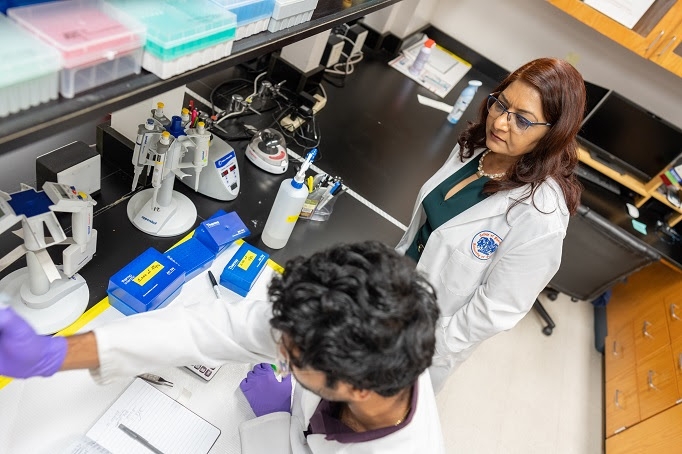UF-developed genetic score improves outcomes by personalizing leukemia therapy
Jatinder Lamba, Ph.D., led a new study showing that a pharmacogenomics score developed at UF could be used by clinicians preemptively to match acute myeloid leukemia patients with the most effective treatment regimen to lead to remission. (Photo by Jesse Jones/UF Health)
University of Florida (UF) Health News
By Leah Buletti
Gainesville, Florida — Using a patient's own genetics to tailor their chemotherapy regimens appears to improve outcomes in children with acute myeloid leukemia, a pediatric cancer for which treatment has gone unchanged for 50 years, a new University of Florida Health-led study shows.
Personalizing chemotherapy treatment using a predictive score can improve long-term survival in acute myeloid leukemia patients by as much as 9% compared with a nonpersonalized approach when applied to the overall population. It can improve outcomes by about 30% in individual patients matched to a more intense chemotherapy regimen, according to the study, published July 30 in Clinical Cancer Research, a journal of the American Association for Cancer Research.
“Given the genetic basis of the score, it could be used by clinicians preemptively to match patients with the most effective treatment regimen to lead to remission,” said Jatinder Lamba, Ph.D., associate dean for research and graduate education and a professor in the UF College of Pharmacy who led the multi-institution study and serves as co-leader of the UF Health Cancer Center’s Cancer Targeting and Therapeutics research program.
“These findings have the potential to be incorporated into clinical trials to effectively match patients for the best possible outcome.”
Acute myeloid leukemia is the second most common form of childhood leukemia and is among childhood cancers with the worst prognosis. For more than 50 years, chemotherapy treatment has relied on the drug cytarabine. Treatment with cytarabine combined with chemotherapy drugs anthracycline and etoposide leads to remission in most pediatric patients with the disease. But a significant number of patients who initially reach remission relapse and the majority who relapse die.
In the study, researchers evaluated how the score could personalize treatments across three induction (or first-line treatment) regimens: standard induction, a high-dose cytarabine-based regimen, and a combination of clofarabine plus cytarabine.
The score, developed by Lamba’s team, was generated by performing a comprehensive pharmacogenomic evaluation of cytarabine’s drug pathway and is predictive of how much of the drug is activated in a cell.
The new study looked at 390 children, adolescents, and young adults newly diagnosed with acute myeloid leukemia being treated on three different regimens across two multicenter clinical trials.
Patients with low pharmacogenetics scores had poor outcomes after treatment with the standard dose of cytarabine combined with two other chemotherapy drugs. However, when these patients received a more intensive drug regimen, either by increasing the dose of cytarabine or combining it with clofarabine, survival significantly improved.
Among patients with a high pharmacogenetics score, the researchers observed worse outcomes with the intensified regimens. That’s most likely due to increased toxicity, which the researchers are investigating further.
“The results suggest that intensifying the dose of cytarabine or combining it with clofarabine can overcome a genetic-based inefficiency in activating the drug that makes some patients less sensitive to it,” Lamba said. “This approach can improve their outcomes by triggering a greater response.”
The researchers also noted that 70% of Black patients had a low pharmacogenomics score compared with 30% of white patients. Black patients with acute myeloid leukemia have historically had worse outcomes than white patients. Socioeconomic factors may be one reason for the disparities. Lamba’s team found the disparities in outcomes could be reduced by using the pharmacogenomics score to personalize chemotherapy regimens. Those findings were reported in more detail in a separate study published recently in JAMA Network Open.
Graduate student Richard Marrero, Pharm.D., is the new study’s primary author and postdoctoral associate Phani Krishan Parcha, Ph.D., is a co-author. Abdelrahman Elsayed, Ph.D., a previous graduate student in Lamba’s group, first reported the score in the Journal of Clinical Oncology in 2022 and is a co-author of the new study.
Investigators from numerous children’s hospitals across the country, including St. Jude Children’s Research Hospital, contributed to the study.
Funding for the study came from the National Cancer Institute, the American Cancer Society, St. Baldrick’s Foundation, and the UF Health Cancer Center.
